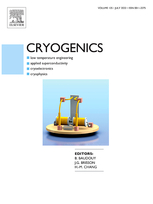
Optimization of variable density multilayer insulation for cryogenic application and experimental validation.
Author(s) : WANG B., HUANG Y. H., LI P., et al.
Type of article: Article
Summary
Cryogenic propellant storage on orbit is a crucial part of future space exploration. Efficient and reliable thermal insulation is one of the dominant technologies for the long-duration missions. This paper presents theoretical and experimental investigation on the thermal performance of variable density multilayer insulation (VDMLI) with different configurations and spacers. A practical method for optimizing the configuration of VDMLI was proposed by iteratively predicting the internal temperature profiles and maximizing the thermal resistance based on the basic layer by layer model. A cryogen boil-off calorimeter system was designed and fabricated to measure the temperature profile and effective heat transfer coefficient of the VDMLI samples over a wide range of temperature (77–353 K). The experimental data confirm that the optimized sample as predicted does have the minimum effective heat transfer coefficient in the control group. The results indicated that the insulation performance of MLI could be improved by 45.5% after replacing the regular uniform configuration with the optimized variable density configuration. For the same optimized configuration, the performance was further improved by 54% by changing the spacing material from none-woven fiber cloth to Dacron net. It was also found that the effective heat transfer coefficient will be much less sensitive to the MLI thickness when it exceeds 30 mm for on-orbit thermal environment.
Details
- Original title: Optimization of variable density multilayer insulation for cryogenic application and experimental validation.
- Record ID : 30021123
- Languages: English
- Source: Cryogenics - vol. 80
- Publication date: 2016/10
- DOI: http://dx.doi.org/10.1016/j.cryogenics.2016.10.006
Links
See other articles in this issue (31)
See the source
Indexing
-
Optimal design of a Thermodynamic Vent System f...
- Author(s) : MER S., FERNANDEZ D., THIBAULT J. P., et al.
- Date : 2016/09
- Languages : English
- Source: Cryogenics - vol. 80
View record
-
Electric orbit transfer vehicle cryogenic prope...
- Author(s) : SCHUSTER J. R., HUYNH C. T., WILLIAMS G. E.
- Date : 1993/04
- Languages : English
- Source: Cryogenics - vol. 33 - n. 4
View record
-
Cryogenic propellant liquefaction and storage f...
- Author(s) : MUELLER P., DURRANT T.
- Date : 1999
- Languages : English
- Source: Cryogenics - vol. 39 - n. 12
View record
-
Analysis of cryogenic propellant behaviour in m...
- Author(s) : FISHER M. F., SCHMIDT G. R., MARTIN J. J.
- Date : 1992
- Languages : English
- Source: Cryogenics - vol. 32 - n. 2
View record
-
ISOCAM experiment cryogenic test results.
- Author(s) : SA L. de, COLLAUDIN B.
- Date : 1992
- Languages : English
- Source: Cryogenics - vol. 32 - n. 2
View record
